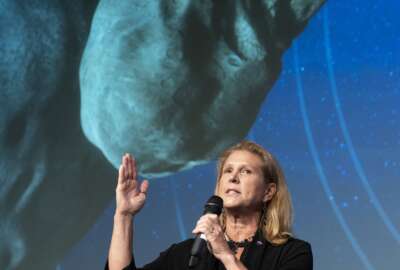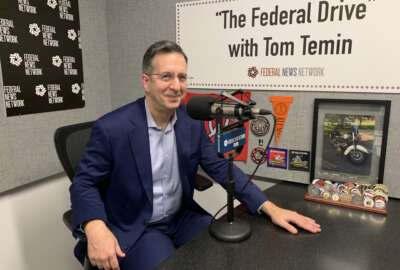This Presidential Rank Awardee might have one of the toughest HR jobs anywhere
How would you like the job of keeping tabs on labor relations in an organization with two million employees? Or of employee accountability? The Federal Drive with...
How would you like the job of keeping tabs on labor relations in an organization with two million employees? Or of employee accountability? The Federal Drive with Tom Temin‘s guest isn’t personally responsible for these things, but he’s the main adviser at the Office of Personnel Management on them. Tim Curry is also a recent recipient of a Presidential Rank Award.
Interview Transcript:
Tom Temin And let’s begin with what your job actually is, because you are not the labor relations negotiator for any agency. And yet you need to know what’s going on across sometimes contentious situations.
Tim Curry Yeah, it’s always a challenge to explain what my job is to folks. So I am the I, the senior career adviser to the director of OPM on labor Management relations policy for the executive branch, and then employee accountability policy. What I mean by that is like how we discipline employees or how we address poor performance. And you’re right. I am not the manager for that. I’m not responsible for taking those actions out across this big government, this big enterprise of ours. But what I do is I help the director implement the administration’s policies regarding labor relations and employee accountability. Plus, I offer technical and policy assistance to agencies that need it, and I support them in any way I can.
Tom Temin And it must be something of a challenge to go from administration to administration, because it seems like the pendulum swings further and further each time over the past, you know, eight, ten, 12, 20 years. And on the one hand, one administration wants to end official time for all of the, you know, labor work and get rid of the offices. Next thing you know, official time is back. The offices are back. So that sounds challenging.
Tim Curry It can be challenging, but it keeps it interesting, too. I would just kind of highlight the point that you made by, you know, I am a career federal employee. And of course, as career federal employees, it’s our responsibility to support and help implement the policies of the administration that’s in charge. So yes, the policies will vary from administration to administration. But I think having that experience, it helps make me a better adviser to whoever that administration is. I can kind of not only give them my technical assistance, but I can offer, uh, historical perspective and maybe point out what could happen, what might happen, uh, depending on which approach that they might want to take.
Tom Temin Yeah. So, for example, you could say, and I’m making this up and not implying that you would have said this, but, well, you know, if you let them have their office space, your negotiations will go faster and then you’ll get closer and you’ll get past the negotiation, get to the labor agreement. And so maybe give them the office, that type of thing. You might be able to say.
Tim Curry I don’t know that I’d get into that kind of specifics. Certainly. Uh, when I’m advising agencies on stuff like that, we might talk about collective bargaining strategies. And obviously, you just highlighted one key component of collective bargaining is horse trading, if you will. You make agreements to kind of achieve your objectives. But certainly when there is a big change in policy direction, then we’ll look at the best way to approach that and advise not only the administration, but advise agencies on the most prudent course of action.
Tom Temin And without being specific, has it ever happened in your career that an administration or an OPM director or someone at OMB will say, you know, Tim, you’re right, we’re only going to do this and maybe not all of that.
Tim Curry Yeah, absolutely. I’m here is an advisor. I don’t make the policy. So, uh, you know, I’ve spent my career, uh, not only at OPM but at the Department of Defense. And I did a stint over at the Patent and Trademark Office. But certainly the labor relations folks know that we advise management, and the management makes the decision, and they might accept part of our recommendations or all of our recommendations, but that just goes with the job.
Tom Temin So you would then maybe characterize yourself as an honest broker?
Tim Curry Yes, I would exactly describe myself that way.
Tom Temin We’re speaking with Tim Curry. He’s deputy associate director for accountability and workforce relations at the Office of Personnel Management and the recipient of a Presidential Rank award. And let’s get to that. Again the administrations don’t spell out exactly what people have done to get the rank award. So how did you get the Rank Award?
Tim Curry Well, there’s probably several areas where they focused in their recommendation for the Rank Award. It really kind of begins primarily when Covid hit. And basically we’re looking at a government wide issue that we needed to act quickly to protect the health and safety of the workforce. So it started with like, uh, the decisions to send employees to work from home. And we needed to do that quickly. But we also recognized that there are over 1800 bargaining units across executive branch covering over 1.2 million bargain employees. So we knew we were going to have bargaining issues, but we also recognize that we needed to take a whole of government approach to deal with those collective bargaining issues. So what I did with the teams that I lead, we start regularly engaging with the agencies, giving them not only our recommendations on not technical matters, but strategies, and we try to do that together. Plus, I have a relationship with the national unions, and separately, I was engaging with them to keep them informed on where the administration was going and the approaches we were going to take. So we are trying to do that in a way to balance health and safety of the workforce, but also honoring collective bargaining obligations while not impacting agency missions in any adverse way.
Tom Temin And of course, we’re still dealing with the long, long tail of that whole situation and the changes that it engendered in the way people work. But early on in the pandemic and you were at OPM then, correct?
Tim Curry Correct.
Tom Temin It must have been a lot of midnight oil, figuring all of this out, how to keep the government going in a sense.
Tim Curry Yeah. And it was truly a team effort with a lot of folks here at OPM and certainly with our partners and agencies, and everybody had a role to play. You know, I approached it from the federal workforce perspective in advising the administration, advising the OPM director, advising OMB that we needed to do in a meaningful way that, again, in honor of our workforce, to keep them healthy and safe, but honoring statutory collective bargaining rights, but also making sure that agencies were still able to accomplish their mission. So there was a lot of time and effort that was spent by a lot of people including me and my team.
Tom Temin And moving to the accountability side of it. Employee accountability, which we mentioned early on the side from labor relations. There’s a lot of mythology surrounding federal employee accountability. You know the myths. You can never fire one, or it takes ten years to fire someone or they just get moved somewhere. That can happen. What’s your view of where accountability is in reality?
Tim Curry I think that the process that’s in place is a straightforward process that we need to make sure that our supervisors are well trained to understand what they can and cannot do. We need to make sure that we support them when they need to address a situation on their staffs or, you know, in their workplaces that whether it’s a conduct issue or a poor performance issue. So it’s really supporting managers and making sure that the appropriate level of training is involved and so forth. It’s not impossible to hold a federal employee accountable. I do believe that the vast majority of federal employees are good employees. They come in and they do their job, and they do it well.
Tom Temin All right. And what’s next for you? You’ve been in the government a long time. You are senior executive. What would you like to accomplish before you call it a day and cash in on the TSP?
Tim Curry That’s that’s great question. Uh, you know, I still have a lot of things I’m doing here at OPM right now. We’re working on a number of things. Obviously, with each administration, we have different policies that we’re pursuing. You know, one of the things that was noted, like in the nomination was my work on helping reset labor management relations that dealt with Executive Order 14-003, which rescinded policies from the last administration and plus the work on worker empowerment. And we’re still doing that. We’ve made a lot of progress. I think we’re heading in a positive direction, but certainly there’s always more work to do and a government that’s big.
Copyright © 2025 Federal News Network. All rights reserved. This website is not intended for users located within the European Economic Area.
Tom Temin is host of the Federal Drive and has been providing insight on federal technology and management issues for more than 30 years.
Follow @tteminWFED






